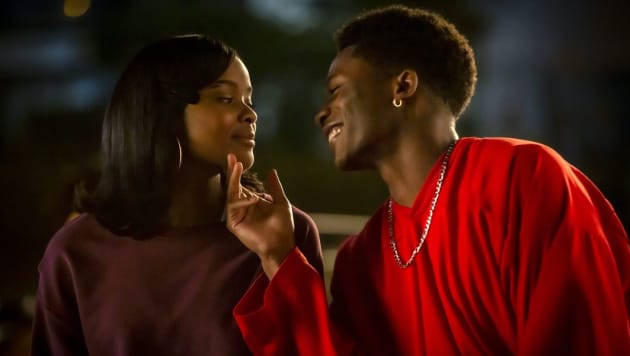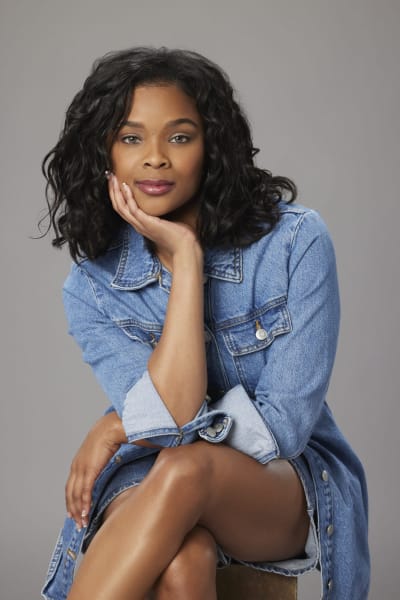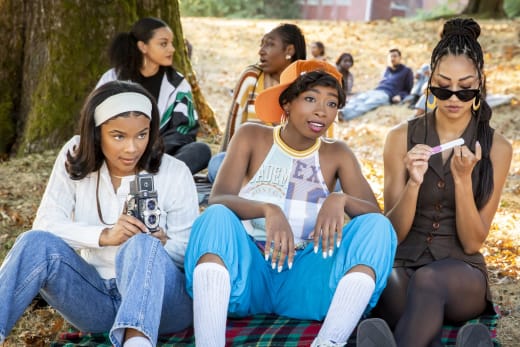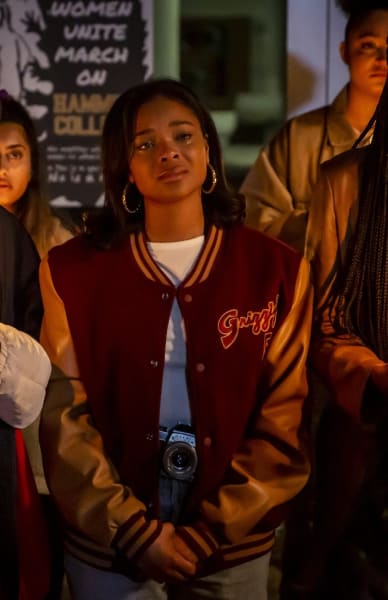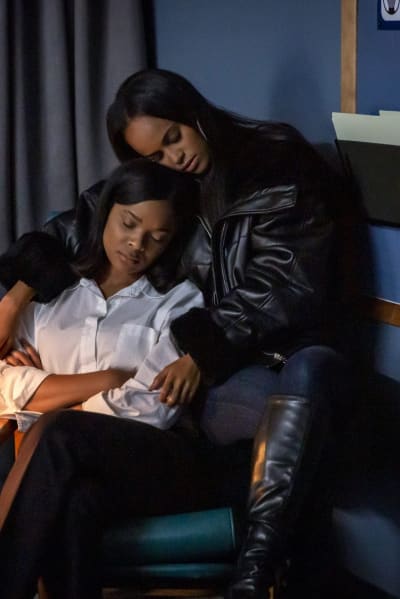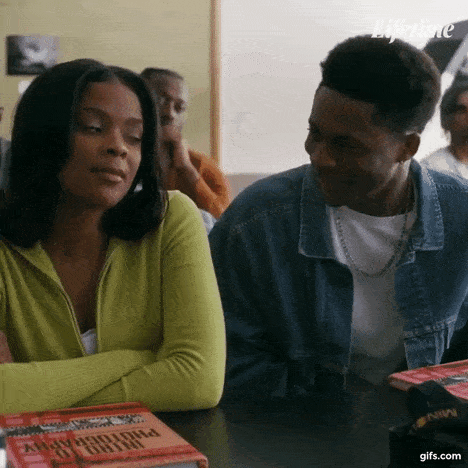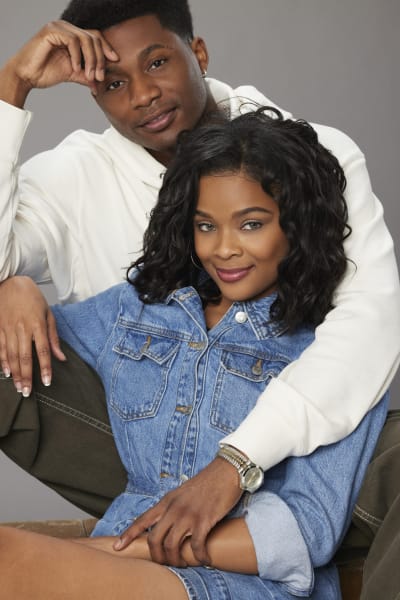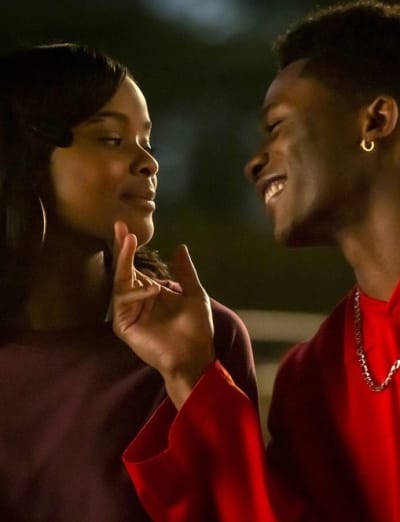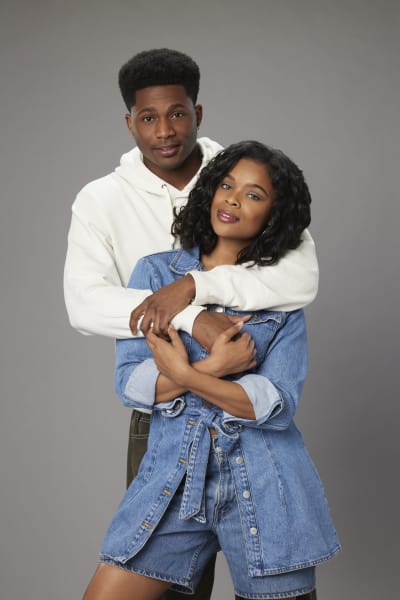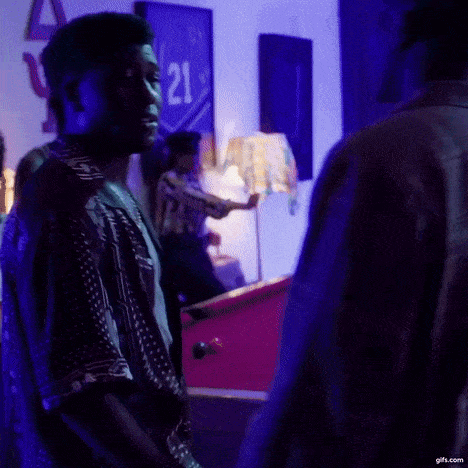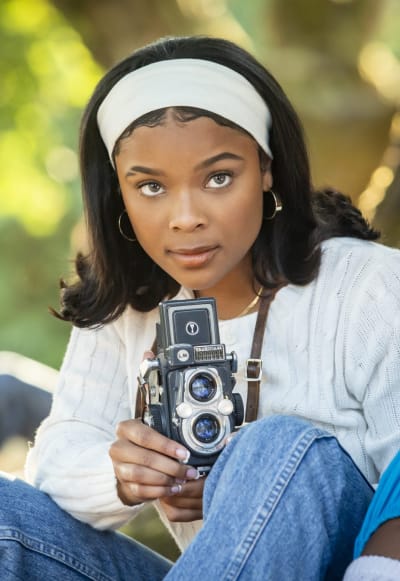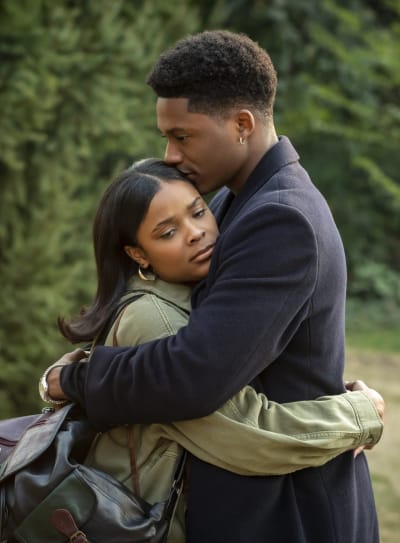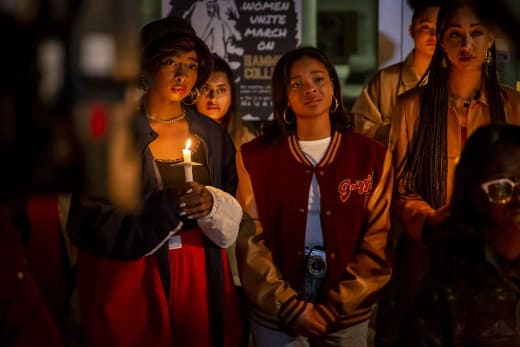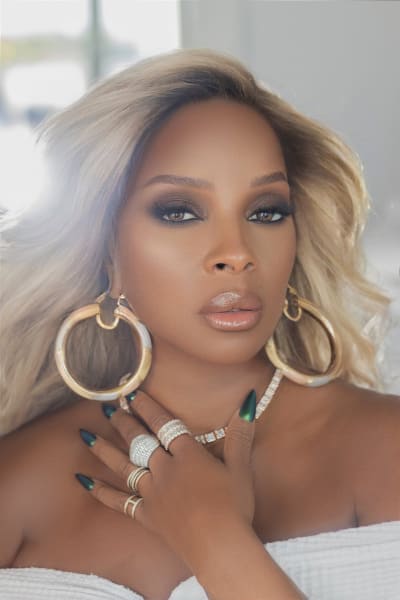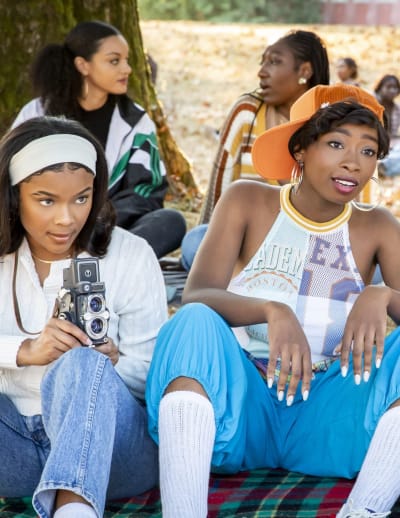Love is messy, complicated, and a complete loss of control.
One of the most shining aspects of Mary J. Blige’s Real Love is how the iconic Renaissance woman’s music inspired the film, and it was done incredibly well.
Mary J. Blige and Lifetime are a collaboration made in heaven, with this genuine, sweet, and real love story that puts not just her music, but music in general, very much at the forefront as it was expertly used as a tool for great storytelling.
At the heart of this film is Kendra, not the love story and chemistry between the leads, which was fantastic, but Kendra herself, as a character and young woman driving this story.
Ajiona Alexus, of 13 Reasons Why acclaim, absolutely shines in this role, deftly carrying the film as lead and capturing all the complexities of Kendra.
It was a perfect coming-of-age story, and Alexus’ thoughtful and nuanced performance genuinely felt transformative for the character.
The Kendra we left at the end of the film had truly evolved from the Kendra we met at the beginning, and that’s a marking of a great story told when we could follow the story and genuinely see the growth in the character.
Kendra was such a genuine and relatable character. The film played with several archetypes that hit close to home and felt authentic.
The idea of perfect and in control Kendra, who was incredibly focused and had spent her entire life in this box, attempting to make something of herself, make her father, and her mother’s memory proud, and amount to something embodied that of a perfect protagonist in a new adult story before she embarks on this journey of discovery.
And Kendra also perfectly encapsulated what we affectionately call “Eldest Daughter Syndrome.” She took on the role of maternal figure and caretaker after her mother passed away, boxing herself into the role of “responsible daughter,” who came across as so focused that she was uptight and hadn’t allowed herself to live and be.
It’s such a common phenomenon, one that isn’t new, though discussed with more frequency these days, that having it depicted with the nineties nostalgic back lay was one of the parts of the film that stood out best.
Kendra was instantly likable, relatable, inspiring, and a protagonist you genuinely rooted for and wanted the best for throughout the film, even as she stumbled through some of life’s and a woman’s biggest obstacles.
So often, with women’s stories, there’s this implication that one must choose between self or love and romance.
And very quickly, the film worked to put that to bed for Kendra, dispelling this idea she had that college was merely a stepping stone to her dream of becoming a photographer and that she couldn’t learn things outside of the traditional realm of education.
One of the more notable instances of this was with Professor Lovett, played by Fire Country‘s Marci T. House.
I genuinely appreciated this woman as a mentor, especially offering the pearls of wisdom and advice as an older woman to this young adult who had missed out on the maternal energy, at least being on the receiving end of it, for too long.
“Your art can only be as alive as you are,” was some advice that Lovett gave her, and one can’t think of something better to dole out to a young woman who seemingly spent much of her life so focused on her next steps forward that she hadn’t taken enough time to look up, take it all in, breathe, and figure out who she really is.
For Kendra to be the true artist she was born to be, she had to be an active participant rather than a passive surveyor in life.
And fortunately, even with the friends she made along the way, she had people who were willing to push her out of her comfort zone, break her free of her shell, and spend the perfect time learning about herself, who she is, what she wants, and what she’s capable of and more.
Of course, that came with varying degrees and shades, as there were some lessons that no one should have to learn.
Life for women on college campuses is hard now, it was when I was on one (I literally got assigned to a mandatory Rape Defense Course during orientation), and goodness only knows how much worse it was in 1992.
It’s upsetting that too often, with women’s coming-of-age stories, sexual assault is essentially a rite of passage. It’s more alarming that it’s so realistic and commonplace, particularly with some demographics, that one can’t even criticize it as a problematic vehicle for storytelling; it’s just… too real, stories that require telling.
Thankfully, the film took some measures and was considerate of the story they were telling when covering both her sexual assault and her suicide attempt.
It wasn’t graphic or exploitative, resting on implication more than anything else, which was the more desirable, sensitive way of handling the subject matter.
It was heartbreaking that the highs of Kendra learning to unwind and experience life, letting her hair down, this necessary step in the college experience also had to include lows like navigating her Freshman year after a traumatic sexual assault with little recourse.
One day, one can experience all that life has to offer and get an introduction to new life stages without getting marred by such traumatic things. Everyone, from her father and sister to her professor and friends, seemed to urge her to live a little, and it was exciting to see that she did.
And Ben was instrumental in that.
Alexus and All American‘s Da’Vinchi had absolutely fabulous chemistry, and they made it effortless to fall in love with this love story.
In many ways, they were evenly matched despite coming from different worlds. They brought out the best in one another, and for a first love, one can’t ask for anything better.
There was a certain innocence to their relationship, particularly in the beginning. Ben was smitten with her almost instantly, and one could understand why.
And while Kendra was a bit reserved and hesitant, it didn’t take long for Ben’s charms to wear her down, and they fell into something genuinely warm and sweet as they melded that perfect balance of flirty first love with genuine friendship.
They became each other’s “person,” understanding one another on a deeper level better than anyone else managed to, which made them a pairing worth rooting for even when life kept throwing some obstacles big and small toward them, or they had moments when it felt like their incompatibility through different life experiences would overcome what drew them together.
Ben’s life was one of privilege, and he had his own naivety because there were so many aspects of Kendra’s life or her personality that he couldn’t quite grasp.
But while Ben’s privileges were notable and used to highlight the differences and challenges between him and Kendra, they also weren’t portrayed as all roses and sunshine for him either.
They managed to capture how his being from a wealthy, established family comes with a certain level of perks while also realistically capturing the drawbacks and how his parents and the crippling weight of the expectations placed upon him were damaging and impacted him greatly.
As the story progresses, their respective ages take hold, allowing for space for these characters to be genuinely sympathetic.
It would be too easy to get frustrated by Ben as this man who can’t quite stand up to his family for the majority of the film or who puts too much stake in his fear of standing alone on his own two feet.
But when you remember that he’s merely 19 at best, just barely out of adolescence, and you think back on where you may have been at that age, many of Ben’s lapses in judgment and blunders fall in line with a young man who has barely got his feet underneath him.
He’s still this kid, afraid of what it means to disappoint his parents or step against them. And the small steps he makes throughout the movie are commendable because his growth comes in its own time.
One of the first things Kendra tells him is that he should “Take the space,” and it’s the type of thing that Ben clings to, coming from a world where he doesn’t have much room to figure out who he is and what he wants out of life outside of falling in line with his parents’ expectations and making them proud.
As frustrating as it was, even his errors with Connie felt perfectly, realistically juvenile and true to form for a man his age.
He loved Kendra but resorted to elementary tactics like using Connie, his parents’ dream woman for him, to make Kendra jealous or having sex with her to take his mind off Kendra, resulting in an unplanned pregnancy.
Ben wasn’t a perfect man, but that’s what made him such a compelling character and love interest, and that’s what made this love story every bit one that lived up to the title.
It wasn’t perfect, but it was real. Real messy. Real complicated. Real difficult. Real challenging. Real love.
One thing that was unmistakable throughout was Ben’s love for Kendra, and that shone through brilliantly.
Their love wasn’t without its casualties, and as much as Connie was an absolute pain in the ass, again, one thinks about her age and how common it is for girls to behave like that.
She treated Kendra horribly and was haughty, snobbish, and rude. And she knew Ben didn’t love her and that their relationship was something that his mother projected onto them rather than of his own doing.
But she, too, was probably a young girl who fell victim to her parent’s expectations and what society expected of her. And their families expected her with Ben, just not how things ended.
She didn’t have much screen time, but one of the most touching moments was when she and Kendra had a real heart-to-heart on that park bench, connecting as two young women trying to figure out their lives and what it meant next.
Connie’s pregnancy was a surprise, but life worked out that way.
But in a refreshing move, Ben finally took that much-needed stand even when Kendra herself was encouraging Ben to marry Connie and do the “proper” thing that his and Connie’s parents expected of them.
He found his own solution and a way through things as an adult, which didn’t result in ignoring the “problem” of having a baby out of wedlock and hoping that Connie and this child would just go away.
He knew he risked his family cutting him off, disowning them, and so forth, for falling short of their expectations and not doing what they wanted, but he made his first real choice for himself anyway.
And when you think of how brave that is for a young man like him at his age, it was one of these quiet moments worthy of pride.
Again, in so many ways, it sucks that Kendra’s love story was marred with many obstacles, but there’s a certain beauty in that too.
It’s beautiful to know that a young man like Ben existed for her, someone who told her that she was “safe” with him when she could’ve concluded that no man was safe after the awful things that Reggie did.
He was a man who protected and defended her, yes, but also allowed himself to be protected and defended, too, without it being a blow to his ego.
He was a man who made the right choice for himself but was also willing to let her go because he wanted to do what was best for her.
As for Kendra, Real Love was beautiful in that, from a romantic standpoint, her relationship with Ben was just that, but more than anything, her real love was about her learning to love herself.
She set out to attend Hammon with a certain goal, and while there were moments where she was afraid that a romance distracted her from that, it only enhanced her story and journey.
She still reached her goals and followed her dreams by the film’s end.
Kendra didn’t have to sacrifice bits of herself or her desires “for a boy.”
We got this remarkable tale that perfectly encapsulated the rich dichotomy of a woman’s strength, particularly a Black woman’s strength, as the film managed to take the notion of the “Strong Black Woman” trope and give it the necessary nuance that so often is lacking.
Kendra was an incredibly strong young woman, and her strength was constantly tested, but through that strength, she was also given the space to be vulnerable, cared for, tended to, and more.
Her strength and desire to be as strong as possible allowed her sexual assault to nearly swallow her up whole, her near suicide attempt being the perfect indicator of that. However, the strength it took to finally open up, be vulnerable, and allow herself to come to grips with what happened to her is what freed her, too.
Kendra possessed that quiet type of strength that felt like it deconstructed some of the problematic or at least narrow depictions of it with Black female characters, and it’s part of what made her such a refreshing character.
As a result, one can’t wait to see what the next chapter in her life has in store for her.
Despite everything she endured in that chaotic first year, from a whirlwind relationship with Ben to a sexual assault and juggling classes, work studies, and jobs, she still excelled.
And now she’s off to Chicago for the opportunity of a lifetime, and one can only guess that there’s nothing but great things in store for her professionally.
The irony isn’t lost when you consider what Ben’s parents thought of her, her pursuit of photography as a profession, and where she came from as a working-class daughter of a sanitation worker.
They were judgmental enough to assume that she’d be some statistic, and now she’s off to make her dreams come true while their son has a child out of wedlock.
Life is funny that way.
But as much as Kendra and Ben’s love story ended bittersweetly, “To Be Continued” is promising. Their paths must definitely cross again — a love story like theirs doesn’t just end, even if it takes years to get back on track.
Fortunately, we’ll get the second part with Strength of a Woman, and we’ll be back with another Lifetime Movie Review for you as well.
With Mary J. Blige as an executive producer and this story inspired by one of her hit songs, it’s not the least bit surprising that music was used so well throughout to drive the narrative.
Mary J. Blige’s hit “Real Love,” serving as Kendra and Ben’s song, couldn’t have been more perfect for them and worked as a theme for the film.
As heartbreaking as it was, one could appreciate that the song that Reggie turned up to drown out her screams as he assaulted her was a trigger for her whenever she heard it.
Even Kendra playing Vivaldi’s Four Seasons perfectly captured the subversion of what she represented with a classical piece and was befitting of the various stages she’d go through throughout the season.
I also couldn’t help but think of one of Blige’s more recent hits, “Whole Damn Year,” which would later feel well-suited for Kendra’s experience with Reggie, but nevertheless, the use of seasons to highlight changes in one’s life was beyond fitting.
But the music was only a piece of the storytelling that worked as they had so much fun with the ’90s fashion and hairstyles, which evoked some nostalgia as well.
Overall, Real Love was a compelling love story from the network and felt different than Lifetime’s usual fare in many ways, something worth coming back to when the second chapter drops.
And we know Mary J. Blige has such an incredible and raw discography that, hopefully, she’ll revisit using her songs to tell more stories in the future.
But we’d love to hear what your thoughts are about this film. Sound off below!
Jasmine Blu is a senior staff writer for TV Fanatic. She is an insomniac who spends late nights and early mornings binge-watching way too many shows and binge-drinking way too much tea. Her eclectic taste makes her an unpredictable viewer with an appreciation for complex characters, diverse representation, dynamic duos, compelling stories, and guilty pleasures. You’ll definitely find her obsessively live-tweeting, waxing poetic, and chatting up fellow Fanatics and readers. Follow her on Twitter.
